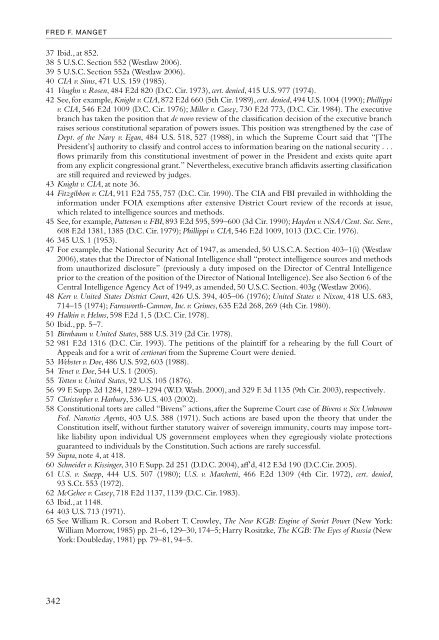Handbook of intelligence studies / edited by
Handbook of intelligence studies / edited by
Handbook of intelligence studies / edited by
Create successful ePaper yourself
Turn your PDF publications into a flip-book with our unique Google optimized e-Paper software.
FRED F. MANGET<br />
37 Ibid., at 852.<br />
38 5 U.S.C. Section 552 (Westlaw 2006).<br />
39 5 U.S.C. Section 552a (Westlaw 2006).<br />
40 CIA v. Sims, 471 U.S. 159 (1985).<br />
41 Vaughn v. Rosen, 484 F.2d 820 (D.C. Cir. 1973), cert. denied, 415 U.S. 977 (1974).<br />
42 See, for example, Knight v. CIA, 872 F.2d 660 (5th Cir. 1989), cert. denied, 494 U.S. 1004 (1990); Phillippi<br />
v. CIA, 546 F.2d 1009 (D.C. Cir. 1976); Miller v. Casey, 730 F.2d 773, (D.C. Cir. 1984). The executive<br />
branch has taken the position that de novo review <strong>of</strong> the classification decision <strong>of</strong> the executive branch<br />
raises serious constitutional separation <strong>of</strong> powers issues. This position was strengthened <strong>by</strong> the case <strong>of</strong><br />
Dept. <strong>of</strong> the Navy v. Egan, 484 U.S. 518, 527 (1988), in which the Supreme Court said that “[The<br />
President’s] authority to classify and control access to information bearing on the national security . . .<br />
flows primarily from this constitutional investment <strong>of</strong> power in the President and exists quite apart<br />
from any explicit congressional grant.” Nevertheless, executive branch affidavits asserting classification<br />
are still required and reviewed <strong>by</strong> judges.<br />
43 Knight v. CIA, at note 36.<br />
44 Fitzgibbon v. CIA, 911 F.2d 755, 757 (D.C. Cir. 1990). The CIA and FBI prevailed in withholding the<br />
information under FOIA exemptions after extensive District Court review <strong>of</strong> the records at issue,<br />
which related to <strong>intelligence</strong> sources and methods.<br />
45 See, for example, Patterson v. FBI, 893 F.2d 595, 599–600 (3d Cir. 1990); Hayden v. NSA/Cent. Sec. Serv.,<br />
608 F.2d 1381, 1385 (D.C. Cir. 1979); Phillippi v. CIA, 546 F.2d 1009, 1013 (D.C. Cir. 1976).<br />
46 345 U.S. 1 (1953).<br />
47 For example, the National Security Act <strong>of</strong> 1947, as amended, 50 U.S.C.A. Section 403–1(i) (Westlaw<br />
2006), states that the Director <strong>of</strong> National Intelligence shall “protect <strong>intelligence</strong> sources and methods<br />
from unauthorized disclosure” (previously a duty imposed on the Director <strong>of</strong> Central Intelligence<br />
prior to the creation <strong>of</strong> the position <strong>of</strong> the Director <strong>of</strong> National Intelligence). See also Section 6 <strong>of</strong> the<br />
Central Intelligence Agency Act <strong>of</strong> 1949, as amended, 50 U.S.C. Section. 403g (Westlaw 2006).<br />
48 Kerr v. United States District Court, 426 U.S. 394, 405–06 (1976); United States v. Nixon, 418 U.S. 683,<br />
714–15 (1974); Farnsworth-Cannon, Inc. v. Grimes, 635 F.2d 268, 269 (4th Cir. 1980).<br />
49 Halkin v. Helms, 598 F.2d 1, 5 (D.C. Cir. 1978).<br />
50 Ibid., pp. 5–7.<br />
51 Birnbaum v. United States, 588 U.S. 319 (2d Cir. 1978).<br />
52 981 F.2d 1316 (D.C. Cir. 1993). The petitions <strong>of</strong> the plaintiff for a rehearing <strong>by</strong> the full Court <strong>of</strong><br />
Appeals and for a writ <strong>of</strong> certiorari from the Supreme Court were denied.<br />
53 Webster v. Doe, 486 U.S. 592, 603 (1988).<br />
54 Tenet v. Doe, 544 U.S. 1 (2005).<br />
55 Totten v. United States, 92 U.S. 105 (1876).<br />
56 99 F. Supp. 2d 1284, 1289–1294 (W.D. Wash. 2000), and 329 F. 3d 1135 (9th Cir. 2003), respectively.<br />
57 Christopher v. Harbury, 536 U.S. 403 (2002).<br />
58 Constitutional torts are called “Bivens” actions, after the Supreme Court case <strong>of</strong> Bivens v. Six Unknown<br />
Fed. Narcotics Agents, 403 U.S. 388 (1971). Such actions are based upon the theory that under the<br />
Constitution itself, without further statutory waiver <strong>of</strong> sovereign immunity, courts may impose tortlike<br />
liability upon individual US government employees when they egregiously violate protections<br />
guaranteed to individuals <strong>by</strong> the Constitution. Such actions are rarely successful.<br />
59 Supra, note 4, at 418.<br />
60 Schneider v. Kissinger, 310 F. Supp. 2d 251 (D.D.C. 2004), aff’d, 412 F.3d 190 (D.C.Cir. 2005).<br />
61 U.S. v. Snepp, 444 U.S. 507 (1980); U.S. v. Marchetti, 466 F.2d 1309 (4th Cir. 1972), cert. denied,<br />
93 S.Ct. 553 (1972).<br />
62 McGehee v. Casey, 718 F.2d 1137, 1139 (D.C. Cir. 1983).<br />
63 Ibid., at 1148.<br />
64 403 U.S. 713 (1971).<br />
65 See William R. Corson and Robert T. Crowley, The New KGB: Engine <strong>of</strong> Soviet Power (New York:<br />
William Morrow, 1985) pp. 21–6, 129–30, 174–5; Harry Rositzke, The KGB: The Eyes <strong>of</strong> Russia (New<br />
York: Doubleday, 1981) pp. 79–81, 94–5.<br />
342
















